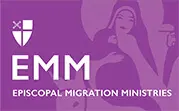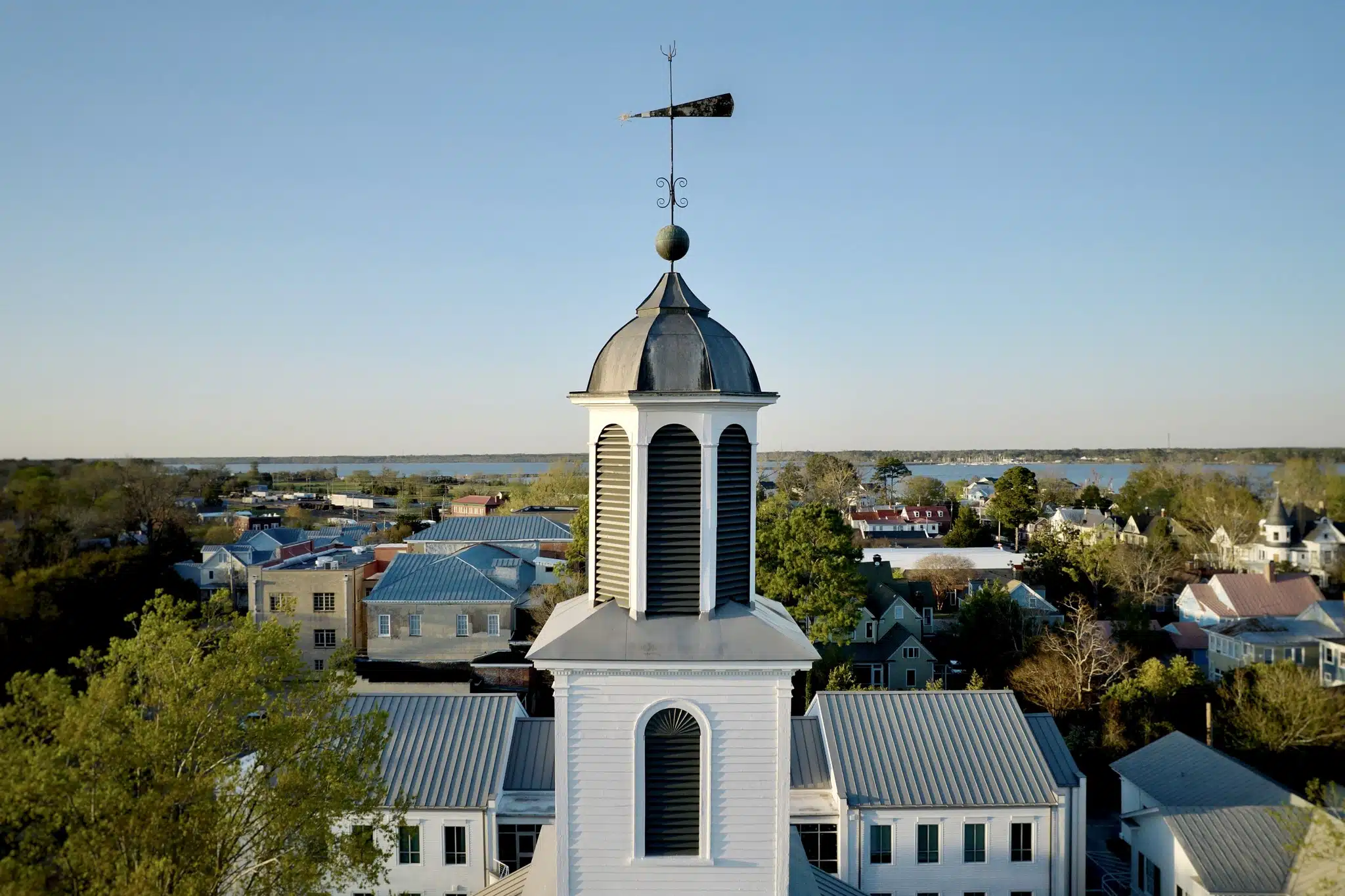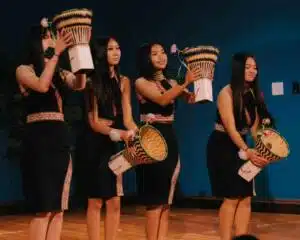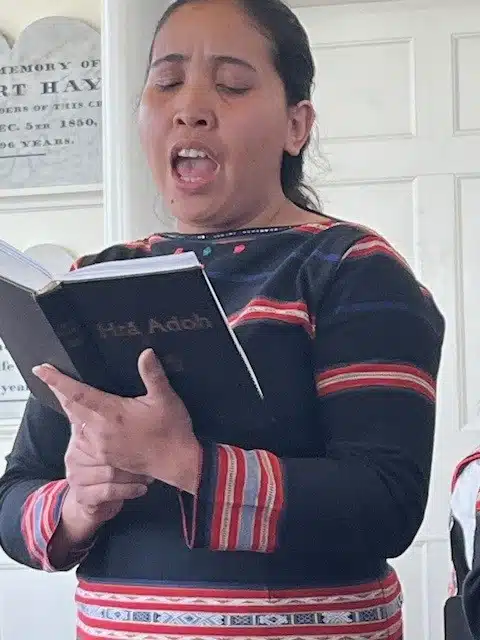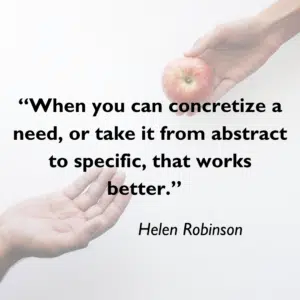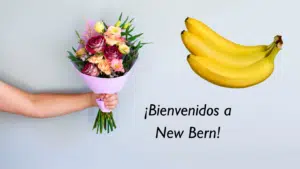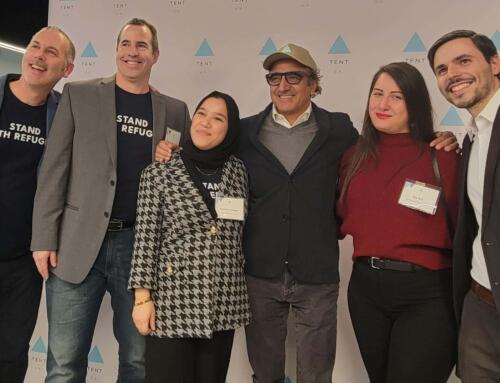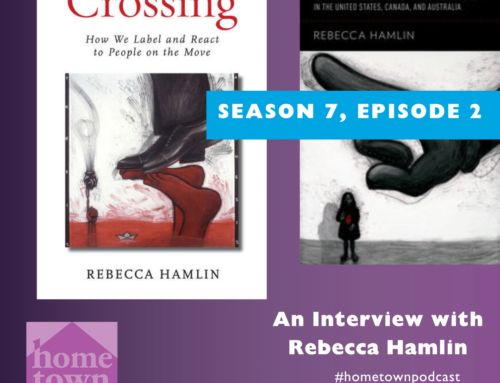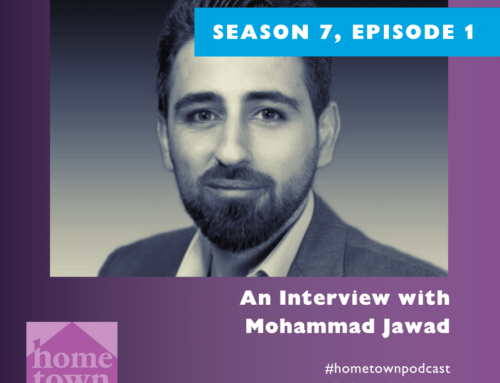This is Part 4 of a series of posts about community sponsorship as practiced by one of EMM’s affiliates, Interfaith Refugee Ministry, in New Bern, NC. Read Part 1, Part 2 and Part 3.
Many community sponsors are rooted in and supported by a faith community. Here, we look at the story of one church in New Bern, NC who chose to sponsor a refugee family.
How did First Presbyterian Church become involved in welcoming refugees?
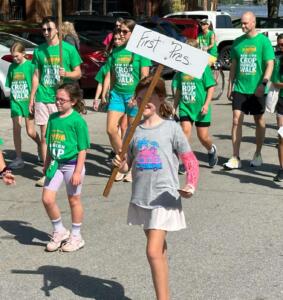
In 2023, some of the people involved in the church’s Outreach Commission decided that it was time to step up again as a co-sponsor group – for newly arriving refugees. In doing this, they were aware that they were both heading down a familiar path and quite intentionally trying to live into a new understanding of what community sponsorship involves.
What does sponsorship entail?
Helen Robinson is one of the members of the Outreach Commission who spearheaded the idea of creating a FPC group to co-sponsor a new refugee household. She had been part of the congregation for several years and had observed the dynamics around issues of sponsorship. As she explained,
Our congregation was hugely involved in the initial welcoming of the Montagnards, hill people who came as refugees from Vietnam. This was around 2002, I think, through Interfaith Refugee Ministry. Many of the old-timers learned a very different model of partnering and supporting refugees. There are about 40 Montagnards who have joined the congregation, and a few years ago, the church began an ESL program that was historically devoted to the Montagnards.
I’ve been active with the Outreach Commission, and about 4 or 5 years ago, I started nudging people to engage again with IRM. Some people were opposed to our becoming involved again with a new family because they thought we weren’t serving the Montagnards adequately.
These were two different models of what a good sponsor is. Ten years after their arrival, [some people] still wanted us to be there at every doctor’s appointment…So we had an ingrained model of engagement that might be regarded as enabling. It was difficult to move beyond that old framework. We’ve had to be very explicit: this is a different model, it’s not a lifetime commitment.
Part of what defines the “new” approach championed by Helen and others is the understanding that sponsoring a refugee family involves supporting them in specific ways for a given period, but not developing a pattern of long-term dependence. Recall the observation made by Amanda Norwood, community outreach and volunteer coordinator at IRM. Co-sponsor groups must be taught to envision the “off-boarding” part of the process. It can be hard for some sponsor groups to relinquish roles that they have invested in. However, “letting go” after a period of intentional support is now generally seen as crucial for newcomers’ self-sufficiency and agency.
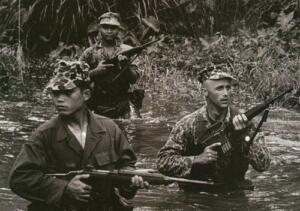
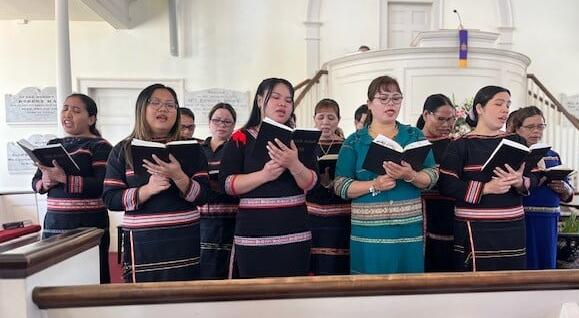
Montagnards, ethnically and linguistically diverse hill peoples of Vietnam, faced persecution from the Vietnamese government for their support of the U.S. military and their desire for religious autonomy. Several successive groups of Montagnard refugees have been resettled to North Carolina, including to New Bern in 2002. Some Montagnards who chose to join First Presbyterian Church were part of a Montagnard choir that sang during services in February 2024 (bottom photos).
How do you convince people to get involved in welcoming refugees?
Members of the Outreach Commission at FPC had to address a tension that many organizations encounter. As Helen Robinson described it,
This is a mainstream church, so a lot of people are here mostly for their personal spiritual edification and fellowship. I say that not in a critical way, but in a descriptive way. There are a lot of folks who like to ‘touch the edges’ of welcoming and outreach, but not so many that have the desire or the ability to get more actively involved.
Indeed, it is often easier to mobilize people to provide material items than to convince them to develop personal relationships with newcomers. The purely “transactional” approach to outreach is often seen as easier than “interpersonal” engagement, because it does not require that people step out of their comfort zone, deal with linguistic barriers, or interact directly with newcomers. Yet as some people know, activities that help foster actual relationships with newcomers are often more meaningful. For they lead over time to mutual discoveries and a deeper sense of shared humanity.
Members of the Outreach Commission eventually agreed with Helen’s suggestion that the church offer to sponsor a new refugee family. In March 2023, they sent out an invitation to all church members. They heard back from a dozen or so who were interested in helping. Given the size of the congregation, this initial response felt a bit underwhelming. But they pressed on, selecting one of their members, Mike Murrie, to coordinate what they called “the Refugee Welcome team” and going through the steps required of potential community sponsors by Interfaith Refugee Ministry.
By the time the new family sponsored by FPC arrived, the congregation had collected a wide range of items needed to furnish their new home.
What really mobilizes people to help?
In April, the FPC group learned that IRM had matched them with an incoming family of Spanish-speaking refugees. There was some confusion about their nationality. They were Colombian but after facing persecution from gangs, had fled first to Ecuador. Knowing who they would be sponsoring and their expected arrival date, the team put out another call for help.
This time, the response was different. As Mike Murrie recalled, “When we said we need these specific things or help with these specific activities, for this specific family, on this specific date, the floodgates opened!” Donations of furniture, household items, and groceries began pouring in, and volunteers, including some from beyond the church who had good skills in Spanish, began to sign up.
Who will do what?
The FPC “Welcome Team” had signed a MOU with Interfaith Refugee Ministry. It spelled out the specific core services that the congregation would be responsible for. For example, IRM would find the housing, and FPC would furnish it. The sponsor team also agreed to meet the newcomers at the airport, prepare a welcoming meal, stock their pantry, help with English language practice, cultural orientation, and getting to know the community and its offerings. This left several core services to IRM, including helping the adults get work authorization, health screenings, and find employment. But this is the advantage of community sponsorship: by sharing the responsibilities, an affiliate and a community sponsor complement each other and help newcomers make vital connections in their new community.
The day of the new family’s arrival finally came, in May 2023. As described by Mike Murrie, the process had moved quickly, and emotions were high:
The family was supposed to arrive at midnight, and the IRM caseworker and I were there at the airport to meet them. But the family got stuck in Charlotte while changing planes and only arrived 12 hours later, exhausted and hungry. By that time, a couple of volunteers, friends of friends who had joined the team and were really skilled in Spanish, were also there to welcome them. I had brought the family some flowers. But one of the Spanish-speaking volunteers brought them some bananas. After their long trip and delay in Charlotte, they were so happy to see those bananas!
So began the process of mutual discovery.
In the next segment of this series, we will see what the FPC team learned from the experience of serving as sponsors, under the new model, to a new family from Colombia.
